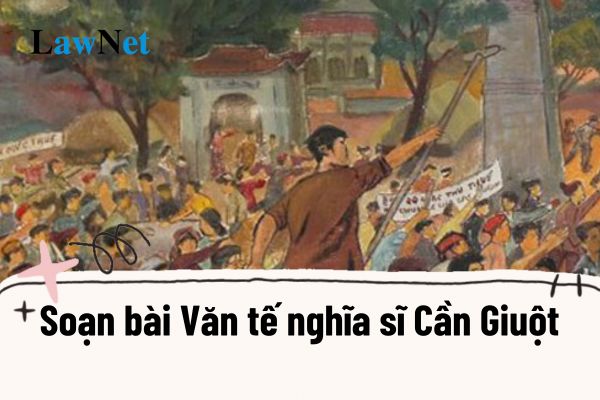What are guidelines on preparing the lesson "Văn tế nghĩa sĩ Cần Giuột" by Nguyen Dinh Chieu for grade 11 students in Vietnam? What are evaluation objectives for the grade 11 Literature in Vietnam?
What are guidelines on preparing the lesson "Văn tế nghĩa sĩ Cần Giuột" by Nguyen Dinh Chieu for grade 11 students in Vietnam?
The "Văn tế nghĩa sĩ Cần Giuột" is one of the literary pieces included in the grade 11 Literature curriculum.
Students can refer to the following guidelines on preparing the lesson "Văn tế nghĩa sĩ Cần Giuột":
|
Guidelines on preparing the lesson "Văn tế nghĩa sĩ Cần Giuột" I. Introduction to the author |
Note: The information is for reference only.

What are guidelines on preparing the lesson "Văn tế nghĩa sĩ Cần Giuột" by Nguyen Dinh Chieu for grade 11 students in Vietnam? (Image from the Internet)
What are evaluation objectives for the grade 11 Literature in Vietnam?
Based on Section VII of the General Education Curriculum for Literature subject issued with Circular 32/2018/TT-BGDDT, the evaluation objectives of the grade 11 Literature aim to provide accurate, prompt, and valuable information regarding the extent to which students meet the required qualities, competencies, and progress throughout the learning process of the subject, to guide learning activities, adjust teaching activities, manage and develop programs, ensuring the progress of each student and enhancing educational quality.
What are the two evaluation methods of grade 11 Literature subject in Vietnam?
Based on Section VII of the General Education Curriculum for Literature subject issued with Circular 32/2018/TT-BGDDT, the two evaluations in the grade 11 Literature are continuous evaluation and periodic evaluation. To be specific:
- Continuous evaluation is conducted continuously throughout the teaching process, organized by the subject teacher; forms of evaluation include: teacher assesses students, students evaluate each other, and students self-assess. For continuous evaluation, teachers may rely on daily observations and notes about students, student responses to questions or presentations, test answers, literary analysis and feedback writing, project assignments, research papers, etc.
- Periodic evaluation is conducted at the end or near the end of a learning period (end of semester, end of the school year) organized by the educational institution to manage teaching activities, ensure educational quality, and serve program and material development. Periodic evaluations often involve written tests or examination papers.
- The exam or test may require essay form (one or multiple questions); it may combine objective testing (objective questions) and essay form (open-ended questions) to evaluate reading comprehension and essay writing on a particular topic following the learned text forms in the curriculum. Oral examinations (to assess speaking and listening) can be used if necessary and feasible.
- In evaluating learning outcomes at the end of the year or school year, the evaluation approach (test structure, question format, difficulty level, etc.) needs to be modernized; ensure and harness text materials that meet evaluation requirements of the students' capabilities, addressing students just rote memorization or copy-pasting available materials; avoid repeated use of previously learned text for accurate evaluation of reading comprehension, analysis, and literary appreciation ability.
Regardless of evaluation form, it must ensure the principle that students can express, manifest their qualities, language proficiency, literary ability, imaginative and logical thinking, their own thoughts and emotions, not borrowed or copied; encouraging creative and personalized writing. Students should be guided to grasp the objectives, methods, and criteria system used to evaluate these qualities and competencies.

